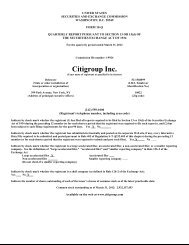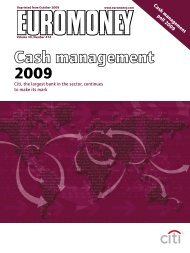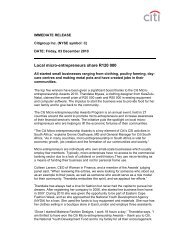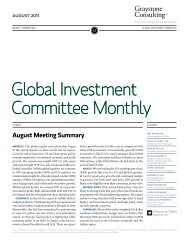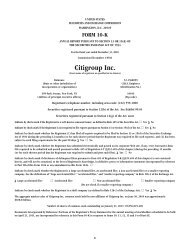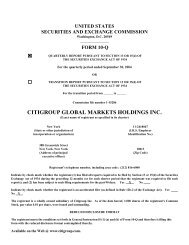FRANkLiN TEMPLETON INVESTMENT FUNDS - Citibank
FRANkLiN TEMPLETON INVESTMENT FUNDS - Citibank
FRANkLiN TEMPLETON INVESTMENT FUNDS - Citibank
You also want an ePaper? Increase the reach of your titles
YUMPU automatically turns print PDFs into web optimized ePapers that Google loves.
PROSPECTUS OF FRANKLIN <strong>TEMPLETON</strong> <strong>INVESTMENT</strong> <strong>FUNDS</strong><br />
index. The “notional amount” of the swap agreement is only a fictive basis on which to calculate the<br />
obligations which the parties to a swap agreement have agreed to exchange. The Company’s obligations<br />
(or rights) under a swap agreement will generally be equal only to the net amount to be paid or received<br />
under the agreement based on the relative values of the positions held by each party to the agreement (the<br />
“net amount”).<br />
Whether the Company’s use of swap agreements will be successful in furthering its investment objective<br />
will depend on the ability of the Investment Managers to correctly predict whether certain types of<br />
investments are likely to produce greater returns than other investments. Because they are two party<br />
contracts and because they may have terms of greater than seven (7) calendar days, swap agreements<br />
may be considered to be illiquid. Moreover, the Company bears the risk of loss of the amount expected<br />
to be received under a swap agreement in the event of the default or bankruptcy of a swap agreement<br />
counterparty. The Investment Managers will cause the Company to enter into swap agreements in<br />
accordance with the guidelines in Appendix B.<br />
Use of Techniques and Instruments Risk<br />
Use of the techniques and instruments contemplated in Appendix B.4 of this Prospectus involves certain<br />
risks, some of which are listed in the following paragraphs, and there can be no assurance that the objective<br />
sought to be obtained from such use will be achieved.<br />
In relation to repurchase transactions, investors must notably be aware that (A) in the event of the failure<br />
of the counterparty with which cash of a Fund has been placed there is the risk that collateral received<br />
may yield less than the cash placed out, whether because of inaccurate pricing of the collateral, adverse<br />
market movements, a deterioration in the credit rating of issuers of the collateral, or the illiquidity of<br />
the market in which the collateral is traded; that (B) (i) locking cash in transactions of excessive size or<br />
duration, (ii) delays in recovering cash placed out, or (iii) difficulty in realising collateral may restrict the<br />
ability of the Fund to meet redemption requests, security purchases or, more generally, reinvestment; and<br />
that (C) repurchase transactions will, as the case may be, further expose a Fund to risks similar to those<br />
associated with optional or forward derivative financial instruments, which risks are further described in<br />
other sections of the Prospectus.<br />
The counterparties to repurchase agreement transactions must have a minimum credit rating of A- or<br />
better, as rated by Standard & Poors, Moody’s or Fitch, at the time of the transactions. A counterparty<br />
with a credit rating of BBB may also be acceptable where the credit rating of the relevant counterparty is<br />
limited by the sovereign debt rating of its domicile country. The collateral received by the Company in<br />
respect of repurchase agreements transactions may be U.S. Treasury bills or U.S. government agency<br />
bonds supported by the full faith and credit of the U.S. government. Any incremental income generated<br />
from repurchase agreement transactions will be accrued to the relevant Fund.<br />
In relation to securities lending transactions, investors must notably be aware that in case of default,<br />
bankruptcy or insolvency of the borrower of securities lent by a Fund, there is a risk of delay in recovery (that<br />
may restrict the ability of a Fund to meet delivery obligations under security sales or payment obligations<br />
arising from redemptions requests) or even loss of rights in collateral received, which risks are mitigated<br />
by a careful creditworthiness analysis of borrowers to determine their degree of risk for said borrowers to<br />
become involved in insolvency/bankruptcy proceedings within the timeframe contemplated by the loan.<br />
Warrants Risk<br />
Investments in and holding of warrants may result in increased volatility of the net asset value of certain<br />
Funds, which may make use of warrants, and accordingly is accompanied by a higher degree of risk.<br />
Shareholders should understand that all investments involve risk and there can be no guarantee against loss<br />
resulting from an investment in any Fund(s), nor can there be any assurance that the Fund(s) investment<br />
objective(s) will be attained. Neither the Investment Managers, nor any of their worldwide affiliated<br />
entities, guarantee the performance or any future return of the Company or any of its Funds.<br />
www.franklintempleton.lu 41



